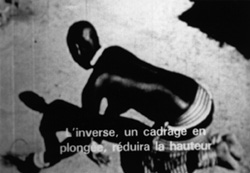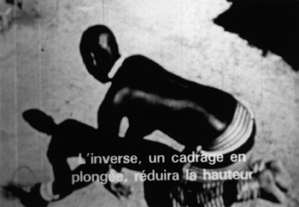Part of Winter 1991
Jean-Claude Bustros has in recent years become one of the most prominent forces in the Quebec experimental film scene. Born in Lebanon, Bustros brings an emigre’s perspective to both traditions of Canadian and Quebecois artists film and the individual subjects of his work. His films are a powerful critique of Cinema which he systematically denounces as a machine of terror. The cinematic apparatus is likened to a war machine. Our cultural obsession with the depictions of death, violence and murder on the screen is overturned to show its exploitative underside. Bustros’ films uncover the paranoid side of the filmmaking process.
What’s That: Der Plan 5 min, 1983.
Electronic and cinematic images appear on the screen. Symbols of the spectacle of society. Bursts of laughter. Then a woman’s voice cries: What’s That!
La queue tigree d’un chat comme pendentif de pare-brise 26 min, 1983-89.
La queue tigree is a subversive half-hour movie lesson that juxtaposes academic narration with shocking documentary footage. By contrasting a voice-over describing the main debates of classical film theory with the most terrifying, literally disastrous images that film can record, Bustros forces the spectator to confront the immense control, and hence, the responsibility, of the “It’s hard to say what the film is about. I know it was born out of anger against tv, movies, politics, society, history, economics and so on and so on. But also from a desire to stop fabricating illusion.”
Zero Gravite
Toronto Premiere
Bustros uses a car accident as a metaphor to explore the power and responsibility of projected images. Around the suspense and paranoia created by the leitmotif of a possible car accident, the film refers to entropy (disorder) and its opposite (structuralism)–two universal tendencies that have reached their peak in this postmodern era, characterized by construction and, at the same time, destruction. Built with miscellaneous archival footage, edited and linked by a disjointed soundtrack, this film leads the spectator to numerous queries through implicit tracks.
“If the title of the film is in French when the film is in English, it is because I wanted to mark an exterior point of view on a culture. The use of English connotes this Other culture, in terms of ideological merchandise, that of the United States that dominated the West after the war and to which, as we know, the whole world can refer. I wanted to make a film about the end of history…”

